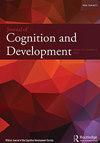听妈妈的话:孩子用等级社会角色来指导他们对人的判断
IF 1.6
2区 心理学
Q3 PSYCHOLOGY, DEVELOPMENTAL
引用次数: 0
摘要
社会类别通常由它们在个体之间形成的边界来定义。然而,许多社会结构描述了个体之间的互补关系,定义了我们对他人的权力和我们对他人的义务,反之亦然。在美国进行的两项研究中,我们调查了一组样本,主要是白人中产阶级儿童,他们在4岁、5岁和6岁时对社会角色的直觉。在实验1中,参与者有两个告密者,一个是主导的(如母亲),一个是从属的(如女儿)。举报人给出了相互矛盾的指示,孩子们决定应该遵循谁的指示,以及哪个举报人拥有更大的社会权力。五岁和六岁的孩子,而不是四岁的孩子,使用社会角色来决定应该遵循哪些指令,所有年龄组的孩子都选择了主导信息提供者,因为他们拥有社会权力。在实验2中,我们通过让相同的被调查者提供关于食物的相互矛盾的信息来探索这种效应的广度。5岁和6岁的参与者相信主导信息者的说法,但4岁的孩子不会优先考虑任何一个信息者的说法。与此同时,当被问及他们会接近谁来了解一种新食物时,孩子们不喜欢任何一个线人。总之,这些发现表明,儿童对等级社会角色的理解在很小的时候就出现了,随着时间的推移而变化,并以微妙的方式影响他们的判断。本文章由计算机程序翻译,如有差异,请以英文原文为准。
Listen to Your Mother: Children Use Hierarchical Social Roles to Guide Their Judgments about People
ABSTRACT Social categories are often defined by the boundaries that they form between individuals. However, many social structures describe complementary relationships between individuals, defining both the power that we hold over others and our obligations to them and vice versa. In two studies conducted in the U.S., we investigated a sample of primarily white, middle class children’s intuitions about social roles at ages 4, 5, and 6. In Experiment 1, participants were presented with two informants, one dominant (e.g., a mother) and one subordinate (e.g., a daughter). The informants gave conflicting instructions, and children determined whose instructions should be followed and which informant had more social power. Five- and 6-year-olds, but not 4 -year-olds, used social roles to determine which instructions should be followed, and children in all age groups selected the dominant informant as someone who held social power. In Experiment 2, we explored the breadth of this effect by having the same informants present conflicting information about food. Five- and 6-year-old participants trusted claims made by a dominant informant, but 4-year-olds did not prioritize claims made by either informant. At the same time, when asked who they would approach to learn about a new food, children did not prefer either informant. Together, these findings suggest that children’s understanding of hierarchical social roles emerges at a young age, changes over time, and influences their judgments in nuanced ways.
求助全文
通过发布文献求助,成功后即可免费获取论文全文。
去求助
来源期刊

Journal of Cognition and Development
Multiple-
CiteScore
4.00
自引率
0.00%
发文量
29
期刊介绍:
The Journal of Cognition and Development is the official journal of the Cognitive Development Society (CDS). Some CDS members are concerned with basic research or theory; others focus on policy issues and practical applications. The range of interests includes cognitive development during all stages of life, and we seek to understand ontogenetic processes in both humans and nonhumans. Finally, their interests encompass typical as well as atypical development, and we attempt to characterize both biological and cultural influences on cognitive change and continuity.
 求助内容:
求助内容: 应助结果提醒方式:
应助结果提醒方式:


